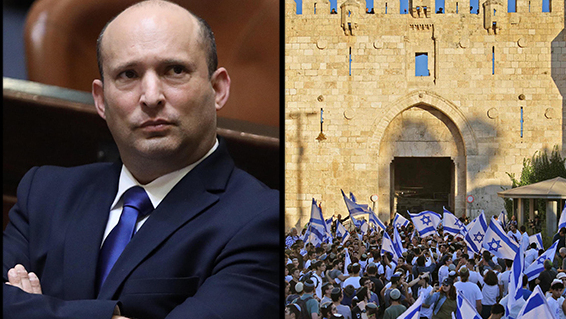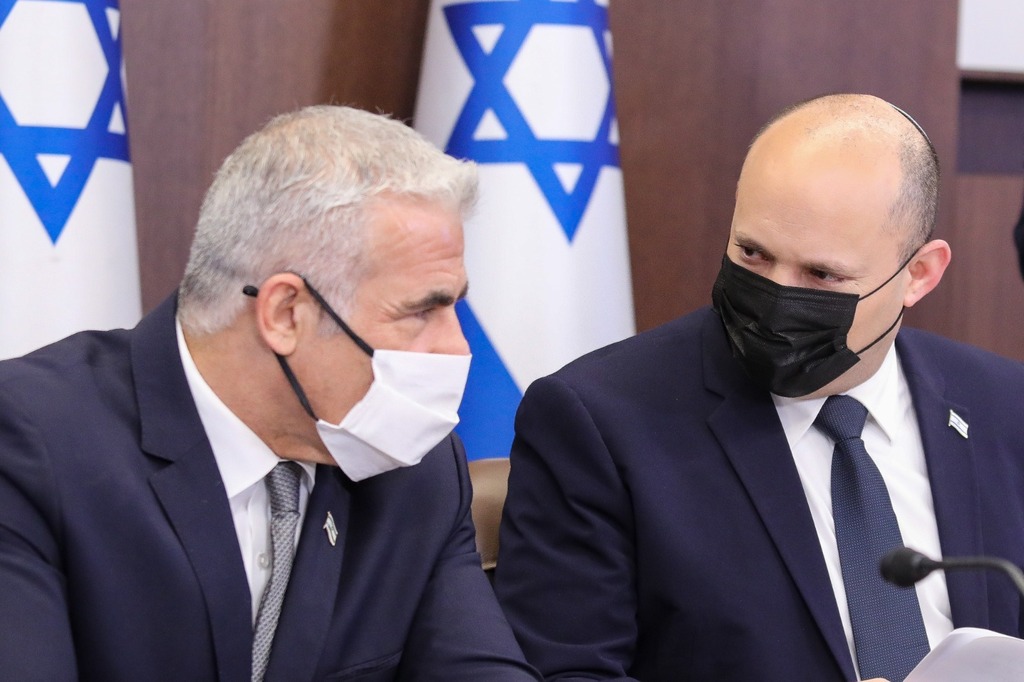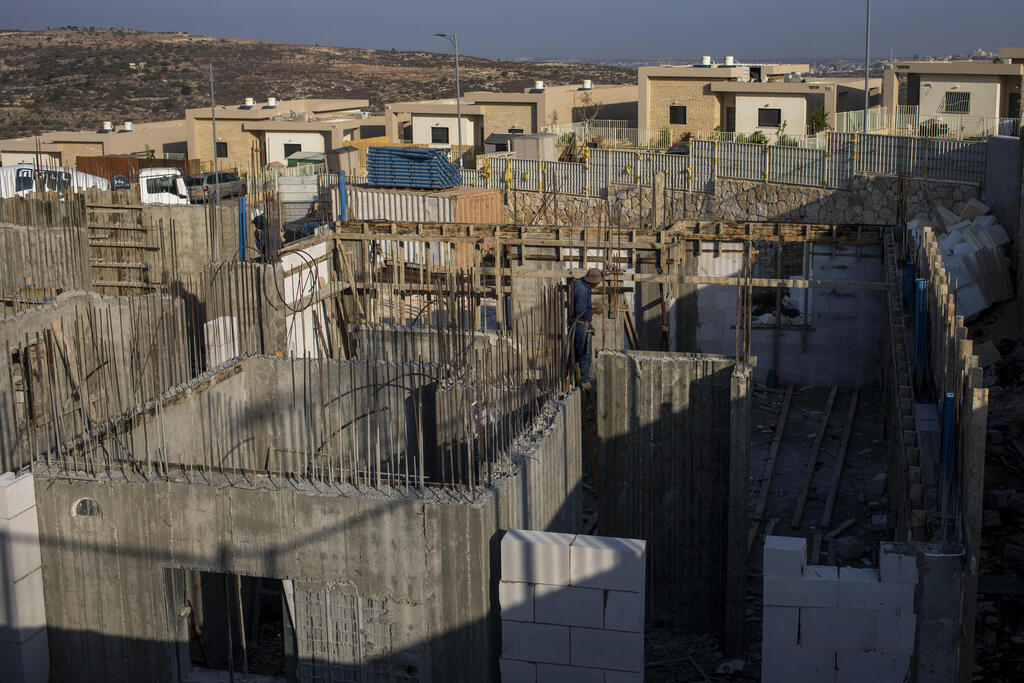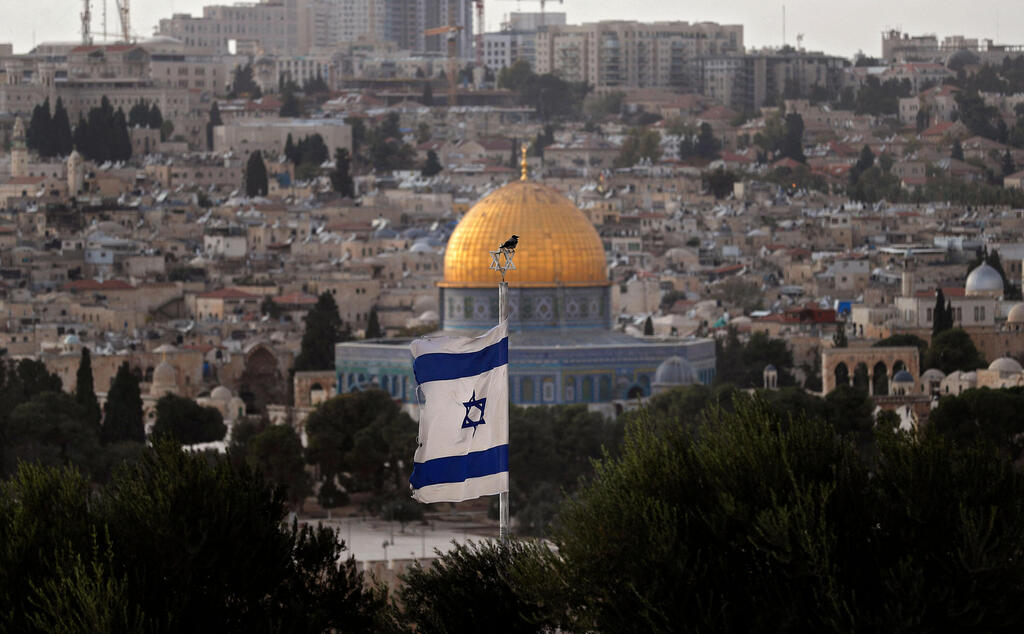Fresh off a budget deal that tested his fragile coalition, Prime Minister Naftali Bennett faces a new headache: the U.S. plans to reopen a Jerusalem consulate for the Palestinians.
The issue is political dynamite for Bennett's eight-party coalition that spans the political spectrum from right-wing Jewish nationalists to pro-peace parties and Arab-Israeli lawmakers.
4 View gallery


Prime Minister Naftali Bennett and right-wing activists in Jerusalem
(Photo: EPA, AFP)
If Bennett allowed Israel's close ally Washington to go ahead with the consulate plan, this would be seen to strengthen Palestinian claims to the contested Holy City - a position that would alienate his right-wing allies.
While Israel regards Jerusalem as its "undivided capital", Palestinians claim the eastern half of the city as the capital of their future state. The unlikely government coalition now ruling Israel was formed in June with the sole aim of ousting then-premier Benjamin Netanyahu.
It is now seen to have passed its toughest test so far, by holding together in the complex task of agreeing on state budgets for this year and next. Having passed this trial, the thinking goes, Washington may now consider it ready to face another tough issue - President Joe Biden's pledge to officially resume Palestinian diplomacy from Jerusalem.
On Saturday, a day after the Knesset legislature approved the 2021 and 2022 state budgets following a marathon session, Bennett met reporters to address the next thorny issue head-on.
"There's no room for another American consulate in Jerusalem," the right-wing leader told reporters. "We always present our position quietly, without drama."
Foreign Minister Yair Lapid at the same briefing suggested the U.S. open their mission instead in the capital of the Israeli-occupied West Bank where the Palestinian Authority (PA) is headquartered. "If the Americans want to open an office in Ramallah," Lapid said, "we have no problem with that."
Most foreign embassies in Israel are located in Tel Aviv. Former U.S. President Donald Trump in 2018 delighted his right-wing ally Netanyahu and many Israelis when he moved the U.S. embassy to Jerusalem, infuriating Palestinians.
At the time he also shuttered the Palestinian consulate there, earning cheers from Israelis who saw it as affirmation that the Palestinians had no political claim to the city.
4 View gallery


Prime Minister Naftali Bennett and Foreign Minister Yair Lapid
(Photo: Mark Israel Salem)
U.S. diplomats responsible for Palestinian affairs continue to work from an office in West Jerusalem. But, under a Biden administration proposal, that office would be re-established as an independent mission to the Palestinians. A separate consulate services office in east Jerusalem could also be re-opened.
A senior Palestinian official, speaking on condition of anonymity, said that the PA was expecting a favorable announcement within Biden's first year.
"We have been told by the Americans that they will reopen their consulate in east Jerusalem and we expect that to be sooner rather than later," the official said.
"It is very important because it is a recognition of east Jerusalem as the capital of the state of Palestine." Restoring a Palestinian consulate is "the one thing the Americans have committed to in terms of reversing Trump," said Daniel Levy, president of the U.S. Middle East Project, a think-tank based in New York.
"But I don't think they are in any hurry to move on it. It is not just that this administration has de-prioritized this issue, it also doesn't want a fight over this issue," he said.
The standoff also comes at a time when support for the PA among Palestinians is at historic lows, according to opinion polls, following the death in Palestinian custody of prominent rights activist Nizar Banat.
While hawkish Bennett opposes Palestinian statehood and supports Jewish settlement expansion in the West Bank, his government has made a series of political outreaches to the PA and pledged to improve economic conditions in the territory.
4 View gallery


New houses in the West Bank Jewish settlement of Bruchin near the Palestinian town of Nablus,
(Photo: AP)
After Israel resumed high-level cooperation with the PA, and with the PA facing credibility issues, Levy questioned whether the consulate is "really the issue the Americans want to fight a big battle over".
Yoav Fromer, head of the Center for the Study of the United States at Tel Aviv University, said that Bennett's stance has wide support among Israelis.
"They don't want the U.S. to try to turn back the clock," he said. "They want to capitalize on the diplomatic gains that they made under Trump."
Former also estimated that the U.S. would aim to avoid a major confrontation with Israel. "This isn't the right battle for this administration to choose right now, they have enough problems," he said. "The U.S. will find other ways to re-engage the Palestinians, first and foremost through money."


